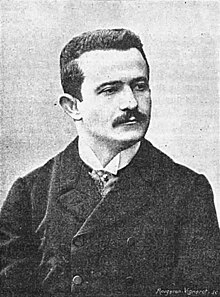Jacques Inaudi

Giacomo Inaudi (13 October 1867[1] – 10 November 1950), also known as Jacques Inaudi in France, was an Italian calculating prodigy.
He was born in Onorato, Piedmont, Italy. As a child he was a shepherd but showed aptitude for mental calculation. Inaudi's abilities attracted the interest of showmen and he toured around the world.
French scientists like Jean-Martin Charcot investigated his abilities, French astronomer Camille Flammarion praised him in strong terms, and Alfred Binet wrote a book on him. Inaudi would repeat the numbers he was given before he began his mental calculations.[2]
Inaudi was referred to by the Nobel-prize-winning immunologist, Élie Metchnikoff (Ilya Ilyich Mechnikov), in his book The Nature of Man: Studies in Optimistic Philosophy (1905). Metchnikoff regarded Inaudi as an example of a mutation, in the sense announced by the Dutch botanist Hugo de Vries (Die Mutationstheorie, Vol. 1, Leipzig, 1901), i.e., a sudden leap to a distinct new type that might be regarded as a new species. Metchnikoff argued that this kind of abrupt leap in evolution might explain how humans had emerged from apes and that Inaudi was proof that such a mutation was possible.[3]
References
- ^ Cnum.cnam.fr
- ^ Nicholas, S.; Gounden, Y.; Levine, Z. (2011). "The memory of two great mental calculators: Charcot and Binet's neglected 1893 experiments". American Journal of Psychology. 124 (2): 235–242. doi:10.5406/amerjpsyc.124.2.0235. PMID 21834408.
- ^ Metchnikoff, É., 1905. The Nature of Man: Studies in optimistic philosophy. New York & London: G.P. Putnam's Sons. pp.56–59
See also
- Serge Nicolas & Alessandro Guida, Charcot and the Mental Calculator Jacques Inaudi, in The European Yearbook of the History of Psychology 1 (2015), p. 107-138
- Burman, J. T.; Guida, A.; Nicolas, S. (2015), "Hearing the inaudible experimental subject: Echoes of Inaudi, Binet's calculating prodigy.", History of Psychology, 18 (1): 47–68, doi:10.1037/a0038448, PMID 25664885
- Endersby, Jim (September 2013), "Mutant Utopias: Evening Primroses and Imagined Futures in Early Twentieth-Century America" (PDF), Isis, 104 (3): 471–503, doi:10.1086/673270, JSTOR 10.1086/673270, PMID 24341261
External links
- ^ Endersby, Jim (September 2013). "Mutant Utopias: Evening Primroses and Imagined Futures in Early Twentieth-Century America" (PDF). Isis. 104 (3): 471–503. doi:10.1086/673270. JSTOR 673270. PMID 24341261.
